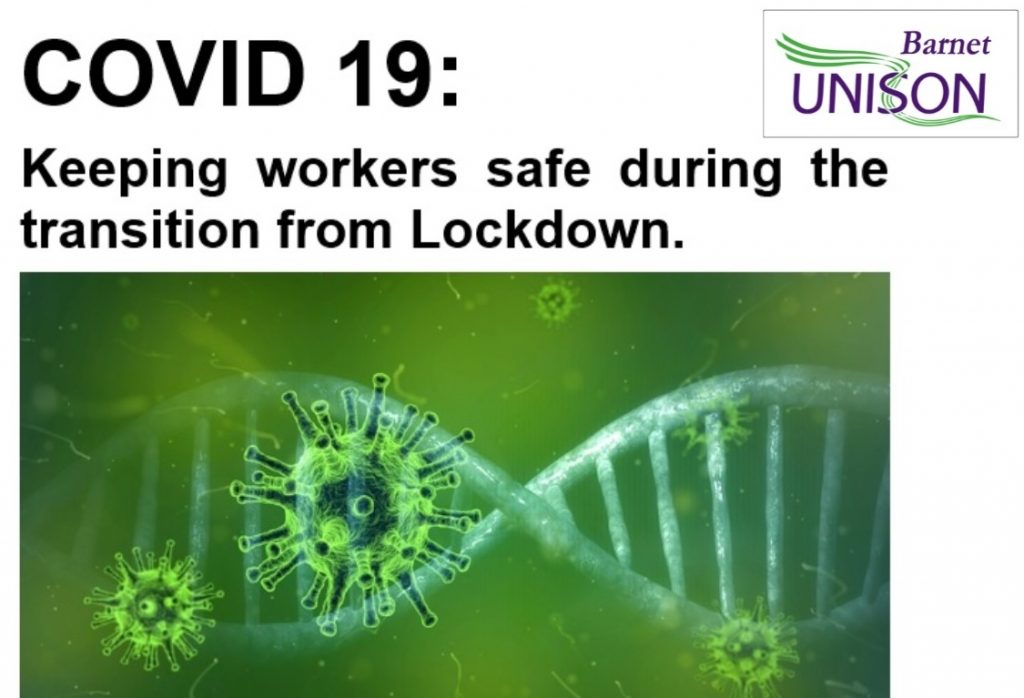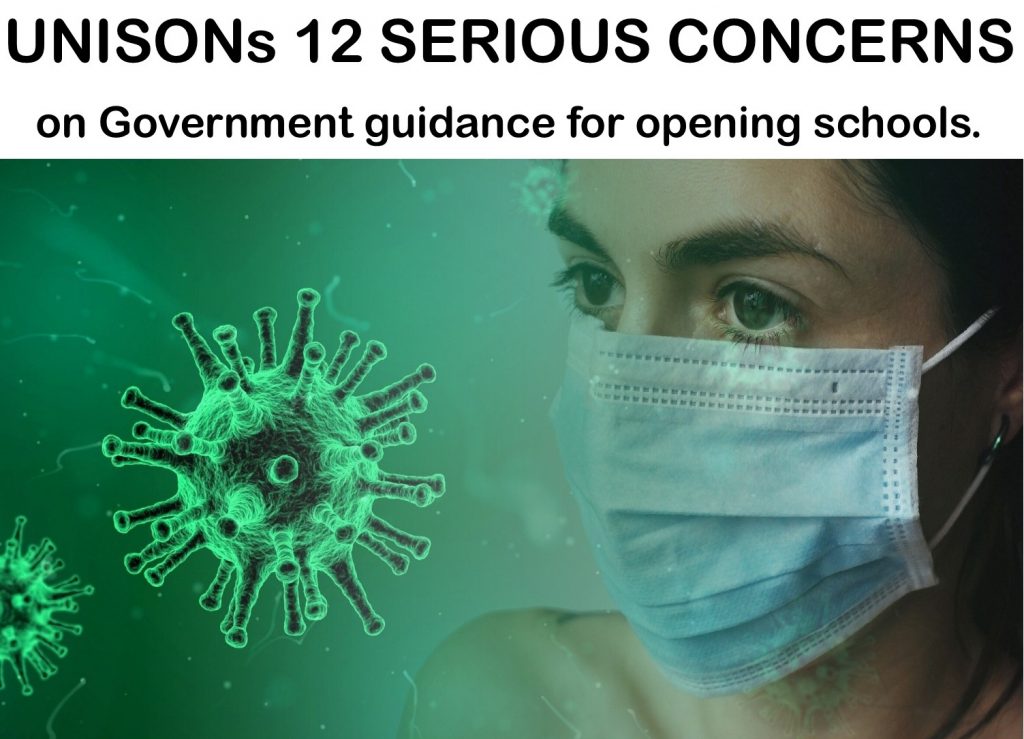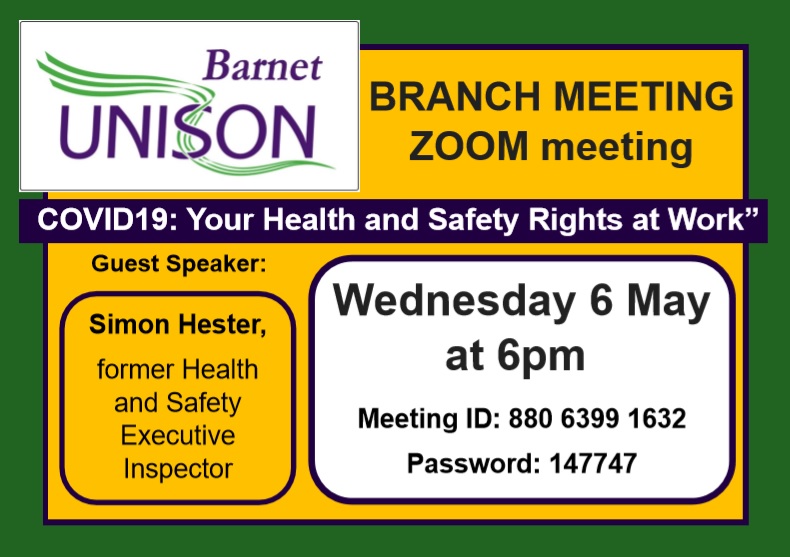Barnet UNISON Bin workers ZOOM meeting.

Join Zoom Meeting
https://us02web.zoom.us/j/81754931410?pwd=UGRYVmlJVC9TbVF5eTFDVFhXVGJBZz09
Meeting ID: 817 5493 1410
Password: 750011
How to use Zoom guide click below for details.


https://us02web.zoom.us/j/81754931410?pwd=UGRYVmlJVC9TbVF5eTFDVFhXVGJBZz09
Meeting ID: 817 5493 1410
Password: 750011

The NJC UNISON side met remotely on May day to take a position on the revised offer received from the national employers of 2.75% and an increase on the basic green book leave entitlement from 21 to 22 days but with no corresponding increase in the long service leave so effectively it meant bringing forward one of the days previously awarded at five years’ service. We are aware the majority of London Councils do not use the Green Book scheme having agreed more generous local provisions.
The meeting was held on a video-conference system which has been approved by Head Office as a tool that protects security and participation. London Region was fully represented with Sean Fox, Clara Mason and Mary Lancaster in attendance.
Prior to the meeting we had sought views from Branches via the regional office, apologies for the shortness of time and thanks to the 25 Branches who responded out of the 33 consulted. Of these 17 supported a recommendation to Reject and 8 supported a recommendation to accept the revised offer.
The meeting received an update from the negotiating team on our efforts to further engage the national employers in joint approaches to central government to source more funding to allow a greater increase. Particularly at the current time when workers in local government are performing vital roles to keep people safe and to provide key services. While the National Employers accepted this the view they had taken was that pursuance of such funding was a matter for the political leadership of the devolved nations rather than part of the negotiations, they also reiterated that the current offer was their final offer and that there had been no appetite to offer a reduction in the working week although they would be happy to enter into “without prejudice” discussions on this as part of the ongoing challenge to meet increased national living wage levels in future years.
We received feedback from the regions which was mixed almost unanimously they expressed a view that the offer was insufficient but there were differing views on whether members would have an appetite for action in the current climate. Some thought it would strengthen the feeling while others were concerned people would be frightened of another economic downturn leading to more cuts.
There was a lengthy discussion on whether consultation was feasible in the current lock-down and a consensus emerged that was reflected in the bulletin issued on 4th May 2020 to Branches. In short this meant that we would go back to the employers and would not accept their offer as being final until approaches had been made to government to seek additional funds. Our concern was to ensure we did not consult members on an offer that would weaken the argument for more money to reflect our contribution to the Covid 19 response.
The full statement can be found at https://www.unison.org.uk/news/article/2020/05/lg-pay-statement/ there is also a blog from Jon Richards at https://www.unison.org.uk/blogs/2020/05/blog-njc-pay/
The only other item discussed was the NJC Guidance on Covid 19 and we explored a number of areas where updated or further guidance might be developed. This included of course the need for robust advice on the eventual relaxation of the lock-down in order to keep members safe. Officers also highlighted they were running some press items on the inadequacy of the Public Health guidance on shielding particularly where workers were living with someone who was shielding. There were concerns that some authorities were adopting these weaker Public Health guidance in preference to the far clearer and safer NJC Circulars issued jointly.
See https://southeast.unison.org.uk/news/article/2020/04/milton-keynes-council-criticised-risking-health-vulnerable-staff/ regarding one Council and https://www.unison.org.uk/news/2020/05/frightened-workers-self-isolating-protect-vulnerable-loved-ones-shouldnt-punished/ regarding UNISON’s National campaign for a more protective and supportive furlough scheme.
Branches having issues with regard to the non-adoption of the NJC provisions by employers who are part of the NJC were asked to make their Regional Office aware of these examples. Generally members of the NJC welcomed the circulars issued to date and the point was made that they demonstrated the role of the NJC being about more than simply pay.
Sean Fox, Clara Mason, Mary Lancaster
* National Joint Council
2020.04. 29. History of National Pay Claims

Barnet UNISON has submitted the following report which sets out our list of demands for full Trade Union engagement in the transition from Lockdown.
“It is really important at this time that workers trust that their employer ensures the workplace is safe. COVID 19 has brought risks to our members’ lives in a way many of our members have never faced before. Therefore, it is important not just to say the workplace is safe, BUT to demonstrate that is safe by being transparent and open and ensuring risk assessments for every work place are easily available for the workforce to read. On Tuesday 5 May 2020, we submitted our report to Barnet Council Chief Executive as the first step to work to ensure all our members are safe at work. We will report back on the negotiations over the coming days and weeks.” (John Burgess, Branch Secretary, Barnet UNISON)
Some of our proposals set out in the report are:
1. The Council to inform and consult with the Trade Unions in a full and timely manner on the transition from Lockdown. By engaging with the Trade Unions the Council can receive our support in the process, and help build workforce support for changed ways of working such as working from home, social distancing measures and deployment of Personal Protective Equipment (PPE).
2. The Council to ensure that protective measures are in place for workers most vulnerable to Covid-19, pregnant women, new mothers and employees sharing households with people requiring shielding.
3. Covid-19 Risk Assessments to be in place relating to specific worksites and work tasks. The Council should consult and obtain agreement with the Trade Unions on these Risk Assessments. No worksites or tasks to be engaged until such Risk Assessments are in place following agreement with the Trade Unions. Risk Assessments to be accessible to all Council employees.
4. Increased stringency and frequency of cleaning of workplaces and equipment during the transition from Lockdown.
5. Social distancing to be in place at work sites, with clear guidance given to workers. Buildings should not be open to the public without strict and enforceable social distancing measures in place, following consultation and agreement with the Trade Unions.
6. To reduce the risk of infection the Council should consider and implement changes to the layout of workplaces, adjusting working patterns, alternating sections of the workforce on sites, and staggering travelling times. The Trade Unions to be consulted with on any such changes.
7. In line with Section 44 of the Employment Rights Act 1996 the Council will not submit any worker refusing to work in an unsafe workplace to Disciplinary or other punitive measures. It recognises workers have the right to withdraw from and refuse to return to an unsafe workplace, and that they have legal protection from dismissal, disciplinary or any other detriment for raising a health and safety issue.
8. PPE must be provided where necessary, and no-one should be asked to re-use PPE inappropriately.
9. Employees to receive instruction on the safe use, maintenance and cleaning of PPE as necessary.
10. Equalities Impact Assessments to be in place for the transition from Lockdown. Across the UK Black and Ethnic Minority workers have suffered disproportionate harm from the impact of the virus. The Council must seek to prevent this disproportionate impact and comply with its public sector equality duty.
11. The Council to inform workers about the availability and criteria of Covid-19 testing and to support workers in obtaining such testing when criteria are met.
Click on link below to read the UNISON report.

1. The guidance restates the DfE‟s blanket line that scientific evidence “indicates” that school staff do not need PPE – what exactly is the scientific evidence which the DfE referring to? Will they publish this scientific evidence in full?
2. Risk assessments should be carried out for staff as well as for pupils. Local unions and health and safety representatives can add help and expertise to this process and should be fully involved.
3. The onus of the guidance unreasonably places pressure and the risk onto members of staff.
4. It will be impossible to provide the care that some children and young people need without close hands-on contact. Risk assessments need to be carried out and the appropriate PPE supplied in these circumstances.
5. The guidance states PPE is only needed in residential care if pupils develop symptoms. No account is taken of the hazards faced by school staff in terms of spitting, scratching or biting, exposure to other bodily fluids or when performing clinical procedures.
6. There is no reference to the safe disposal of waste or PPE including masks and gloves.
7. The guidance rightly highlights the paramount necessity of strict hygiene, but does not mention soap or the provision of hand sanitiser. UNISON members have raised concerns about lack of soap and having to bring their own sanitiser to work. UNISON has already raised concerns with the DfE over previous guidance suggesting some cleaning items may be rationed.
8. There is no recognition of the complexity of the issues being faced by schools with vulnerable young people – for instance what about the risk of children attending who live in crowded accommodation either in a hostel, B&B or where a large family are sharing?
9. The guidance recognises that classes should be kept to small sizes but there is no definition of what a small size is. What happens if there is an outbreak and it leads to staff absences? For pupils with SEND there may be a one to one ratio. It is common practice in SEND settings to have 8-10 students to a ratio of 5 staff.
10. The guidance recommends that soft or cuddly toys are not to be shared by students – how is this to be managed in a SEND or early years environment?
11. Social distancing is impossible to fully maintain in schools. There is no reference to the built environments that schools work in. Some schools are small with narrow corridors and passage ways.
12. Any redeployment of staff across special schools will be unsettling for the pupils who are familiar with individual teachers/teaching assistants/ learning support assistants. It could also add to the risk of spreading the virus.
Recommendation UNISON recommends that the Government’s advice is urgently revised to take full account of the needs of pupils and staff, including realistic expectations of what is achievable. It should also take into account the duty of care that the DfE and schools have to their pupils, staff and the communities in which they operate. Ofsted have identified sufficient risk to issue their inspectors with PPE in order to safely undertake emergency inspections. PPE is vital for staff who are working on the front line – without the undertaking of risk assessments for staff and the appropriate provision of PPE then some schools could be unsafe for staff, pupils and the wider community.
To read full statement click on link below
2020.04.21. UNISON-response-to-DfE-guidance-on-SEND-risk-assessment

How to download Zoom: Zoom can be accessed by computer, tablet, or smart phone.
To access Zoom via smartphone or tablet, open the AppStore (Apple) or the Play Store (Android), search “Zoom Cloud Meetings”, select and install.
To access Zoom via computer, follow the link below and download the “Zoom Client for meetings” https://zoom.us/download#client_4meeting
How to join a meeting:
Open Zoom using your chosen electronic device. You should be given three options – join a meeting, sign up, or sign in.
You may wish to sign up, but you do not have to sign up to join the meeting.
Select “Join a meeting”, enter the “Meeting ID”. This should have already been provided to you. Alternatively, if you have been provided with a link, select this link and you should be automatically directed to the meeting.
If the meeting requires a password you should have been provided with this already.
How to change your name: We would like you to display your name so we can identify people properly.
On a phone, tap the screen, select “Participants”, select yourself (at the top of the list), select rename.
On a computer, hover over the main video/audio display area, select “Participants”, hover over yourself (at the top of the screen), select rename.
If you want to speak: You will need to raise your virtual hand. I will then select people in turn to speak. When it is your turn, I will unmute you.
On a phone, please tap your screen, select “More”, and select “Raise Hand”
On a computer, hover over the main display area, select “Participants”, at the bottom of the participants list there should be a “Raise Hand” button, select this button.
If you are hosting the meeting, ask people to practice putting their hands up here. Pause the meeting to ensure everybody knows how to use this feature.
Using the chatroom: Members can type messages to each other during the meeting using the “Chat” feature. You may wish to use this to ask questions.
On a phone, tap your screen, select “Participants”, select “Chats” in bottom left hand corner.
On a computer, hover over the main display area, select “Chats”.
Making decisions: If we need to take votes on decisions during the meeting, you will be asked to vote by raising your virtual hand. Votes will be taken by simple majority. See above “If you want to speak” for how to raise your virtual hand.

Barnet UNISON Branch ZOOM meeting “COVID19: Your Health and Safety Rights at Work”
After five weeks of lockdown and ongoing media speculation about when lockdown will end Barnet UNISON has secured Simon Hester former Health and Safety Executive Inspector as our Guest Speaker for our first ZOOM Branch Meeting on Wednesday 6 May at 6pm.
To join the Barnet UNISON Zoom meeting click on the link below.
https://us02web.zoom.us/j/88063991632?pwd=MjRnbUErVVp0MEsxNDFubWtRUzd6QT09
Meeting ID: 880 6399 1632
Password: 147747

“Dear Head,
I hope that you are well and managing to cope under these extraordinary circumstances we all find ourselves in.
We, the Trade Union Leads, are writing to all Heads in response to the ongoing speculation as to when schools may be asked to open up again especially as a vaccine or cure is not likely to available in this calendar year and, therefore, it is likely that we will need to continue social distancing.
Our concerns are both for the children and the staff.
We want to ensure the schools are as safe as possible in terms of dealing with COVID 19.
Our members are very worried about schools re-opening before it is safe. They have noted that the provision of PPE for NHS workers and Care workers has been a worrying and ongoing issue, being played out on national media on a daily basis. Whilst assurances have been made that supplies of PPE for the staff will be delivered day after day by senior members of the Government it is clear for all to see that this has not happened and it continues to be a serious issue for staff. Furthermore our members have watched with horror when news broke last week that PPE supplies were running out and that sadly Public Health England were revising their guidance down in response to supply rather than the level of risk to the workforce and patients.
It is with this back drop that we want to ensure that when schools open, the school is able to assure staff and parents that the workplace will be a safe place for all.
To this end we are asking all schools what measures they currently have in place in terms of the following:
Please feel free to contact me if you have any queries or believe we may be able to support your school and staff during this national emergency.
Stay Safe
Regards
Barnet Trade Unions”
If you have any questions or concerns email the branch at
You can keep up to date with Barnet UNISON here on our
Website here https://www.barnetunison.me.uk/wp/
Facebook https://www.facebook.com/BarnetUNISON/
Twitter https://twitter.com/barnet_unison

An emerging issue being raised by some of our members across a number of employers is the issue of forced annual leave.
It has come to our attention that staff are being asked to take annual leave during the current lockdown.
Workers have a statutory right to take annual Leave.
For many workers during the current national crisis their home has become their workplace.
It is important for the mental health and well being of all workers that they have time away from their workplace.
During the lockdown workers are unable to go away on holidays
Barnet UNISON position is that unless a worker requests to take annual leave during the lock down the employer should not be using this crisis to force workers to take annual leave.
What does the Government say?
“Workers who have not taken all of their statutory annual leave entitlement due to COVID-19 will now be able to carry it over into the next 2 leave years.”
“There is also an obligation on employers to ensure their workers take their statutory entitlement in any one year – failure to do so could result in a financial penalty.
The regulations will allow up to 4 weeks of unused leave to be carried into the next 2 leave years, easing the requirements on business to ensure that workers take statutory amount of annual leave in any one year.
This will mean staff can continue working in the national effort against the coronavirus without losing out on annual leave entitlement.
The changes will also ensure all employers affected by COVID-19 have the flexibility to allow workers to carry over leave at a time when granting annual leave could leave them short-staffed in some of Britain’s key industries, such as food and healthcare.”
Read more here
https://www.gov.uk/government/news/rules-on-carrying-over-annual-leave-to-be-relaxed-to-support-key-industries-during-covid-19
If you are having any annual leave issues with your employer please contact the union at contactus@barnetunison.org.uk or you can leave a message speaking slowly and clearly please include your name and telephone number on 020 8359 2088. We will respond as soon as we can.